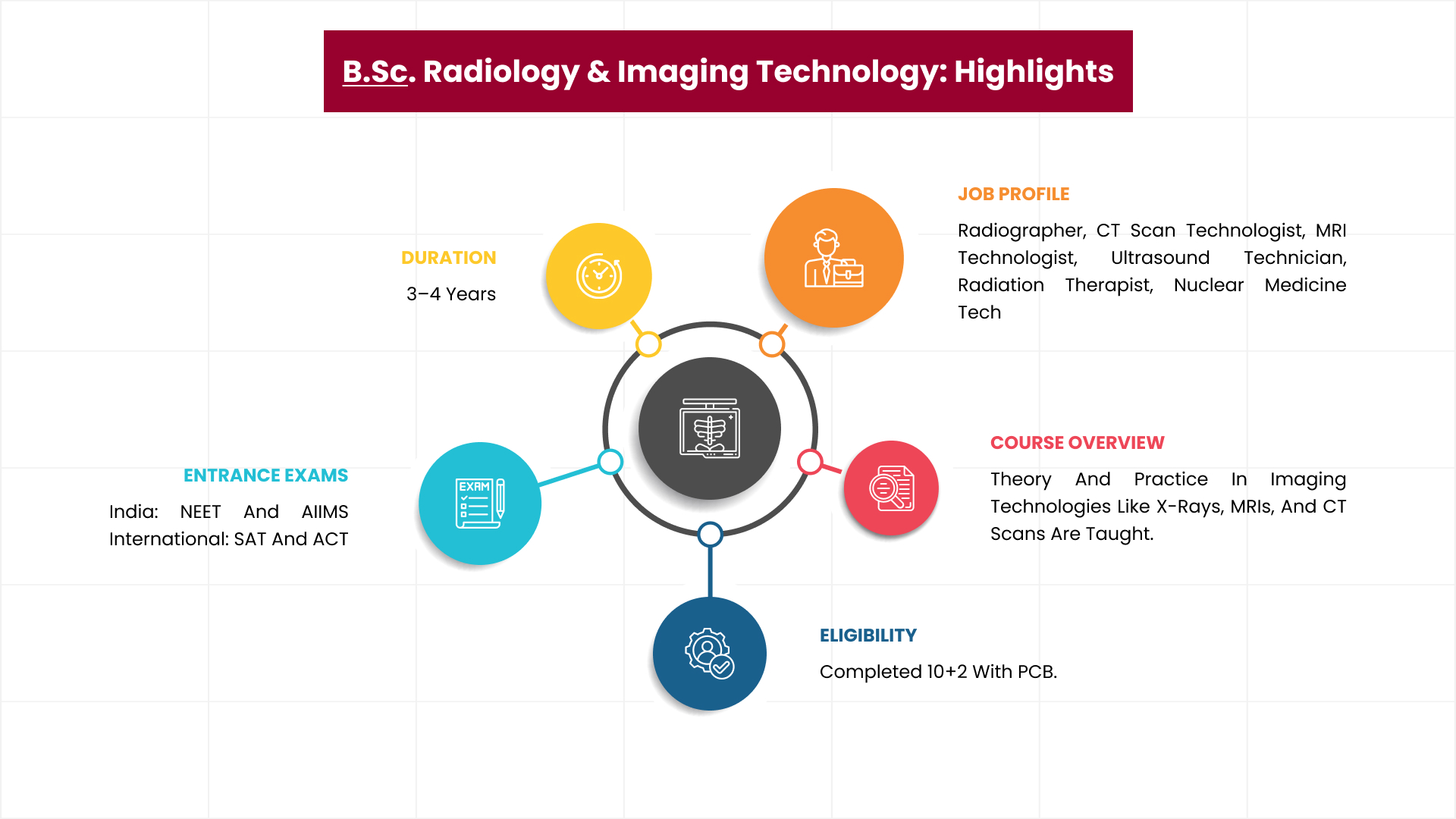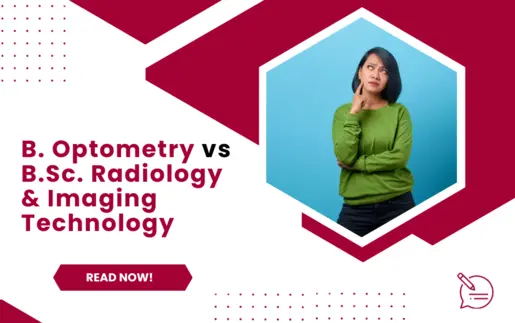Scope Of B.Sc. Radiology & Imaging Technology In India And Abroad
Hello, aspiring radiology enthusiasts from India! Intrigued by the scope of B.Sc. Radiology & Imaging Technology in India and abroad? Pursuing a BSc in Radiology offers a unique fusion of technology, medicine, and patient care tailored to your career goals. This vibrant discipline extends beyond mere X-rays and MRI scans, offering insights into the human body that were once unthinkable.
Emphasising advanced technology alongside empathetic patient care, a BSc in Radiology is more than just an academic qualification—it explores contemporary healthcare's core. Eager to delve into this captivating field? Let's embark on this enlightening journey together!

Course: A Quick Overview
Scope of B.Sc. Radiology & Imaging Technology in India and abroad is an ever-changing and vibrant discipline within medical science that provides a deep insight into the realm of diagnostic imaging methods. This crucial course, essential to contemporary healthcare, varies in duration depending on the institution and the country.
Duration of the Course:
Typically, the program extends over a period of 3 to 4 years.
Course Overview:
The curriculum combines theoretical understanding with hands-on experience in imaging technologies such as X-rays, MRI, and CT scans.
Admission Criteria:
India: Applicants should have completed 10+2 with a background in science (Physics, Chemistry, Biology).
International: A high school diploma with science courses is generally required; however, some countries might need specific qualifications.
Entrance Examinations:
India: NEET and AIIMS are the primary entrance exams.
International: SAT and ACT are accepted by some foreign universities.
Required Skills:
- Strong analytical and observational abilities.
- Technical expertise in operating radiology equipment.
- A solid grounding in biology and physics.
Scope Of B.Sc. Radiology & Imaging Technology In India And Abroad: Curriculum and Career Paths
A B.Sc. Radiology & Imaging Technology program typically spans three years and covers a comprehensive curriculum. Students delve into subjects like human anatomy and physiology, physics of radiation, radiographic techniques, and medical ethics. They gain hands-on experience through practical sessions, learning to operate various imaging equipment like X-ray machines, CT scanners, and MRI units.
Scope Of B.Sc. Radiology & Imaging Technology In India
The table below highlights the diverse career paths open to B.Sc. Radiology & Imaging Technology graduates:
|
Job Title |
Description |
Average Salary (INR) |
|
Radiographer |
Performs diagnostic imaging examinations using X-ray, fluoroscopy, and other imaging modalities. |
INR. 300,000 - INR. 500,000 per annum |
|
Radiology Technician |
Assists radiologists in patient care, preparing them for imaging procedures. |
INR. 250,000 - INR. 400,000 per annum |
|
Radiology Nurse |
Provides specialised nursing care to patients undergoing radiological procedures. |
INR. 350,000 - INR. 550,000 per annum |
|
Radiology Assistant |
Assists radiologists with administrative tasks and patient management. |
INR. 200,000 - INR. 350,000 per annum |
|
Ultrasound Technician |
Operates ultrasound machines to create images of internal organs for diagnostic purposes. |
INR. 300,000 - INR. 500,000 per annum |
|
MRI Technician |
Conducts Magnetic Resonance Imaging (MRI) scans to diagnose medical conditions. |
INR. 350,000 - INR. 600,000 per annum |
|
Sonographer |
Uses ultrasound technology to create images of the foetus during pregnancy. |
INR. 300,000 - INR. 500,000 per annum* |
|
CT Scan Technologist |
Operates Computed Tomography (CT) scanners to generate detailed cross-sectional images of the body. |
INR. 350,000 - INR. 600,000 per annum |
|
Medical Image Analyst |
Analyses medical images like X-rays and CT scans to identify abnormalities. |
INR. 400,000 - INR. 650,000 per annum |
Higher Education Opportunities
For individuals seeking to elevate their careers, the scope of B.Sc. Radiology & Imaging Technology in India and abroad serves as a stepping stone. Graduates can pursue further education options, like:
- M.Sc. in Medical Imaging Technology
- M.Sc. in Radiotherapy
- PhD in Medical Physics
Scope Of B.Sc. Radiology & Imaging Technology In Abroad
Radiologic technologists are in demand across the globe. Here's a look at some key job roles available to those with a B.Sc. in Radiology:
|
Job Title |
Responsibilities |
Salary Range (Estimated) - Converted to INR** |
|
Radiographer |
Operates X-ray machines, prepares patients, protects from radiation, produces images for analysis |
INR 35,00,000 - INR 60,00,000+ per annum . |
|
CT Scan Technologist |
Specialises in computed tomography scans, administering contrast materials, positioning patients |
INR 40,00,000 - INR 70,00,000+ per annum . |
|
MRI Technologist |
Operates magnetic resonance imaging equipment, ensuring patient comfort and generating high-quality scans |
INR 40,00,000 - INR 70,00,000+ per annum . |
|
Ultrasound Technician |
Uses ultrasound equipment to create diagnostic images of internal organs and tissues |
INR 30,00,000 - INR 55,00,000+ per annum . |
|
Radiation Therapist |
Works with oncology teams to plan and administer radiation treatments for cancer patients |
INR 45,00,000 - INR 80,00,000+ per annum . |
|
Nuclear Medicine Tech |
Prepares and administers radioactive substances (radiopharmaceuticals) for diagnostic and therapeutic purposes |
INR 35,00,000 - INR 60,00,000+ per annum . |
Scope Of B.Sc. Radiology & Imaging Technology In India And Abroad: Potential Countries
Several countries offer excellent opportunities and substantial salaries for skilled radiology professionals:
- United States: High technology adoption and a robust healthcare system make the US a prime destination for radiologic technologists.
- Canada: With a universal healthcare system and demand for skilled workers, Canada is a great option for those seeking stability and a good work-life balance.
- Australia and New Zealand: Both countries are known for their excellent healthcare and ample opportunities within diagnostic imaging.
- United Kingdom: The National Health Service (NHS) is a major employer of radiology professionals, offering diverse experience. Thus, the scope of B.Sc. Radiology & Imaging Technology is abundant in the UK.
- Gulf Countries (UAE, Saudi Arabia): These regions experience rapid healthcare expansion and offer attractive compensation packages for radiologic technologists.
Scope Of B.Sc. Radiology & Imaging Technology Abroad: Key Features
- Exposure to Advanced Technology: Many developed nations offer state-of-the-art equipment and innovative imaging techniques.
- Diverse Patient Populations: Working internationally provides exposure to a wider range of cases and pathologies.
- Competitive Salaries and Benefits: Compensation packages abroad can often be more lucrative than those in one's home country.
- Professional Development: International experience boosts your resume and may lead to specialisation opportunities.
- Cultural Immersion: Living and working abroad is often a life-enriching experience.
Pathways and Requirements
To practice radiology abroad, graduates typically need:
- Degree Recognition: Ensuring your B.Sc. Radiology & Imaging Technology degree is recognised in the target country.
- Licensing/Registration: Meeting the licencing or registration requirements of the specific country or region.
- Work Visa/Permit: Obtaining the necessary legal permissions.
- Language Proficiency: Demonstrating fluency in the country's official language(s) is often necessary.
Future Scope of B.Sc. Radiology & Imaging Technology In India And Abroad
The field of radiology, with its focus on medical imaging for diagnosis and treatment, is undergoing a revolution. A B.Sc. in Radiology equips graduates with the knowledge and skills to be part of this exciting journey, offering promising career prospects both in India and abroad.
Rising Demand
The global population is growing and ageing, leading to an increased need for accurate and timely medical diagnoses. Radiology plays a pivotal role here, with techniques like X-rays, MRIs, CT scans, and ultrasounds providing crucial information for physicians. This translates to a rising demand for qualified radiologic professionals, expanding the scope of B.Sc. Radiology & Imaging Technology in India and abroad.
Technological Advancements
Radiology is intrinsically linked to technology, and the field is constantly evolving. B.Sc. graduates will be at the forefront of these advancements. New imaging techniques like interventional radiology and artificial intelligence (AI) are transforming diagnostics and treatment. The curriculum equips students with a strong foundation in physics, biology, and computer science, allowing them to adapt to these innovations and potentially contribute to groundbreaking research.
Global Opportunities
The skills acquired through a B.Sc. in Radiology are highly transferable. Graduates can seek job opportunities not only in India but also internationally. Developed countries often face shortages of qualified radiology professionals, making them attractive destinations for Indian B.Sc. graduates.
India-Specific Advantages
The Indian healthcare sector is experiencing significant growth, with a rise in private hospitals and diagnostic centres. This creates a strong demand for skilled radiology professionals. Government initiatives to improve healthcare infrastructure further increase job prospects for B.Sc. graduates.
In conclusion, the scope of B.Sc.Radiology in India and abroad offers a dynamic and in-demand career path in India and globally. With technological advancements, an ageing population, and an ever-growing need for accurate diagnostics, the future is bright for skilled radiologic technologists.
In India, the expanding healthcare sector translates into abundant job opportunities. Government initiatives and the growth of private institutions fuel the demand for qualified professionals. Internationally, countries like the United States, Canada, Australia, the United Kingdom, and those in the Gulf region offer excellent compensation, cutting-edge technology, and a chance to experience diverse healthcare systems.
Seize the Opportunity: Admissions Open at CGC Jhanjeri
Ready to embark on this rewarding journey? Chandigarh Group of Colleges (CGC) Jhanjeri invites you to pursue your B.Sc. in Radiology! Their comprehensive program blends theoretical knowledge with hands-on experience, preparing you to excel in the field. Seats are filling fast, so don't delay! Apply quickly to secure your place in this exciting and transformative program.
Remember: Scope Of B.Sc. Radiology & Imaging Technology In India And Abroad Opens The Door To:
- Diverse Career Paths: Become a radiographer, technician, specialised sonographer, CT technologist, and more.
- Global Opportunities: Practice your skills in countries with a high demand for radiologic professionals.
- Technological Advancements: Stay up-to-date with innovations in medical imaging.
- Higher Education: Pursue advanced degrees like an M.Sc. or Ph.D.
The time is now! Explore the scope of B.Sc. Radiology & Imaging Technology in India and abroad and take the first step towards a fulfilling career. Visit the CGC Jhanjeri website or contact their admissions office to start your application today.
Frequently Asked Questions
Q1. Does radiology have scope in abroad?
Ans. Yes, radiology has significant scope abroad due to the increasing demand for medical imaging services globally. Various countries offer opportunities for radiologists in hospitals, diagnostic centres, and research institutions.
Q2. Can I go abroad after B.Sc radiology?
Ans. Yes, after completing B.Sc. Radiology & Imaging Technology, you can pursue opportunities abroad. Many countries welcome skilled radiology professionals, offering diverse career paths in healthcare, research, and academia.
Q3. Which country is best for B.Sc radiology?
Ans. Countries like the USA, Canada, Australia, and the UK are considered among the best for pursuing B.Sc. Radiology & Imaging Technology due to their advanced healthcare systems, ample job opportunities, and quality education infrastructure.
Q4. Which country is best for Indian radiologist?
Ans. Countries like the USA, Canada, Australia, and the Middle Eastern countries are popular destinations for Indian radiologists due to their favourable job markets, competitive salaries, and opportunities for career advancement.
Q5. What is the future of BSc radiology?
Ans. The future of B.Sc. Radiology & Imaging Technology looks promising with advancements in medical technology and an increasing focus on preventive healthcare. Graduates can expect diverse career options in diagnostic imaging, research, teaching, and healthcare management, contributing to improving patient care and outcomes globally.



















